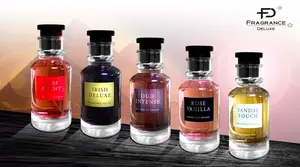Unlocking the Magic of Fragrance: A Journey of Scents and Memories
Explore the world of fragrance and its captivating role in our lives. Learn how scents can evoke memories, enhance moods, and become an essential part of personal style.
The Power of Scents in Eliciting Emotions

Fragrance refers to a pleasant or aromatic odor or scent. It is the characteristic smell of a substance or a product and is often associated with pleasing or alluring scents. Fragrances can be created from a combination of aromatic compounds, natural essential oils, synthetic aroma chemicals, and fixatives. These components are carefully blended to produce a specific scent profile.
Fragrances are used in a wide range of products and applications, including perfumes, colognes, body sprays, scented lotions, candles, air fresheners, and even household and cleaning products. They serve various purposes, from enhancing personal grooming and beauty routines to creating a pleasing atmosphere in homes or commercial spaces.
How to identify male and female fragrance
Identifying male and female fragrances, often referred to as "masculine" and "feminine" scents, is a subjective process influenced by cultural norms and individual preferences. Fragrances do not have a gender; they are designed for anyone to wear based on personal taste. However, the fragrance industry often categorizes scents into these two categories to make it easier for consumers to find scents they might like. Here's how to differentiate between fragrances typically associated with each gender:
1. Floral and Fruity Notes:
- Feminine: Fragrances marketed as feminine often feature floral and fruity notes like rose, jasmine, orchid, and various fruits such as citrus, berries, and peaches.
- Masculine: Masculine scents tend to have fewer floral and fruity notes. Instead, they may emphasize woody, earthy, or spicy elements.
2. Woody and Earthy Notes:
- Feminine: While not exclusive to femininity, these notes may be more subtle or blended with florals in women's fragrances. Woody and earthy notes can include sandalwood, patchouli, and vetiver.
- Masculine: Men's fragrances often feature prominent woody and earthy notes, such as cedarwood, oakmoss, and leather.
3. Spices and Oriental Accords:
- Feminine: Feminine fragrances can incorporate spices and oriental notes but in a softer and more delicate manner. For example, they may use spices like vanilla and cinnamon.
- Masculine: Masculine fragrances may have bolder and more intense spice and oriental elements, such as black pepper, cardamom, and amber.
4. Citrus and Aquatic Notes:
- Feminine: Citrus and aquatic notes are used in feminine fragrances, but they are often balanced with other floral or sweet elements to create a lighter, more delicate scent.
- Masculine: Masculine fragrances may have more straightforward and invigorating citrus and aquatic notes with a focus on freshness.
5. Packaging and Marketing:
- Fragrance bottles, packaging, and marketing often reflect gender stereotypes. Feminine fragrances may have more delicate or colorful packaging, while masculine fragrances might be marketed with darker, more robust imagery.
6. Personal Preference:
- Ultimately, fragrance choice should be based on personal preference rather than gender stereotypes. What matters most is how a scent makes you feel and how well it complements your individual style and personality.
What is the difference between Perfume, Fragrance, Scent and Essential?
"Perfume," "fragrance," and "scent" are often used interchangeably, but they can have slightly different connotations depending on the context. Here's a breakdown of the differences:
- Perfume:
- Perfume is a specific type of scented product that falls under the broader category of fragrance. Perfume typically refers to a concentrated liquid fragrance that is applied to the skin to provide a long-lasting scent. Perfumes are known for their potency and can last for hours.
- Perfumes come in various concentrations, which determine their strength and longevity. These concentrations include Eau de Parfum (EDP), Eau de Toilette (EDT), and Eau de Cologne (EDC), with EDP being the most concentrated and long-lasting.
- Fragrance:
- "Fragrance" is a broad term that encompasses a wide range of scented products, including perfumes, colognes, body sprays, scented lotions, and more. Fragrance can refer to any substance or combination of substances that imparts a pleasant smell.
- In the beauty and personal care industry, "fragrance" can refer to the aromatic compounds used in various products to create a specific scent.
- Scent:
- "Scent" is a general term that describes the smell or odor of something. It doesn't specifically refer to a product but rather the characteristic smell associated with an object, substance, or environment.
- "Scent" can be used in everyday language to describe the smell of flowers, food, nature, or any other source of aroma.
- Essential:
- "Essential" is often used in the context of "essential oils." Essential oils are highly concentrated, natural oils derived from plant materials such as flowers, leaves, stems, roots, and seeds. They capture the plant's natural aroma and are extracted through processes like distillation or cold pressing.
- Essential oils are known for their potent and pure aromatic qualities, and they are commonly used in aromatherapy, as well as in the formulation of natural and holistic products for their therapeutic and fragrant properties. Essential oils are typically obtained from botanical sources.
Can I use fragrance oil in soap?
Yes, you can use fragrance oil in soap making. Fragrance oils are a popular choice for adding scents to homemade soaps. Here are some key points to keep in mind when using fragrance oil in soap:
- Choose Quality Fragrance Oils: Select fragrance oils that are specifically formulated for soap making. These fragrance oils are designed to be skin-safe and perform well in soap recipes. They come in a wide variety of scents, allowing you to create customized soaps with different fragrances.
- Follow Recommended Usage Rates: Each fragrance oil has a recommended usage rate provided by the manufacturer. It's essential to follow these guidelines to ensure that your soap maintains a pleasant scent without becoming overpowering or causing skin irritation.
- Add Fragrance During the Soap-Making Process: Fragrance oils are typically added during the soap-making process, specifically during the soap's "trace" stage. This is the point in soap making when the soap has thickened but is still pourable. Adding fragrance oil at this stage allows for even distribution throughout the soap mixture.
- Stir Thoroughly: When adding fragrance oil to your soap mixture, be sure to stir it in thoroughly to ensure that the scent is evenly dispersed.
- Consider Allergies and Sensitivities: While fragrance oils are formulated to be skin-safe, it's essential to be mindful of potential allergies or sensitivities. If you or your intended soap users have sensitive skin, consider performing a patch test to ensure there are no adverse reactions to the fragrance.
- Test Your Soap: Before making a large batch of soap, it's a good idea to create a small test batch to assess how the fragrance oil interacts with your soap recipe. This allows you to adjust the scent strength or make any necessary modifications before producing a full batch.
- Label Your Soaps: Be sure to label your soap products accurately to indicate the presence of fragrance oil and the specific scent used. This information can be valuable for consumers who may have allergies or scent preferences.
Can you use fragrance oil on skin?
Yes, you can use fragrance oil as a substitute for traditional perfume, but there are some important considerations to keep in mind:
- Choose Skin-Safe Fragrance Oils: Ensure that the fragrance oil you intend to use is formulated to be safe for direct skin contact. Some fragrance oils are specifically designed for use in perfumes and are skin-safe, while others may not be suitable for this purpose. Check the product label and guidelines provided by the manufacturer to confirm that it can be applied to the skin.
- Dilution: Fragrance oils are often highly concentrated, so it's a good idea to dilute them before applying to the skin. You can dilute fragrance oil with a neutral carrier oil, such as jojoba oil or fractionated coconut oil. This not only reduces the concentration but also helps with even application and longevity of the scent.
- Patch Test: Before applying a fragrance oil as a perfume on a larger area of your skin, perform a patch test. Apply a small amount of the diluted fragrance oil to a discreet area, such as the inside of your wrist or elbow, and monitor for any adverse reactions like redness, itching, or irritation. If you experience discomfort or skin reactions, discontinue use immediately.
- Application: When applying fragrance oil, focus on pulse points, such as your wrists, neck, and behind your ears. These areas generate heat, which can help to diffuse the scent.
- Sensitivity and Allergies: If you have sensitive skin or a history of fragrance allergies, exercise caution when using fragrance oil as a perfume. Some fragrance oils may contain components that can trigger allergic reactions or skin sensitivities.
- Use Sparingly: Due to the concentration of fragrance oils, a little goes a long way. Use them sparingly to avoid an overpowering scent.
- Reapply as Needed: Fragrance oils may not have the same longevity as commercial perfumes. Depending on the specific fragrance oil, you may need to reapply it periodically throughout the day to maintain the desired scent.
- Storage: Store your fragrance oil in a cool, dark place to preserve its scent quality. Exposure to light and heat can affect the fragrance's stability.

Fragrance is a term that refers to a pleasant or distinctive scent or odor. It plays a significant role in our daily lives, from personal grooming and perfumes to scented products and environmental aromas. Key points to remember about fragrance include:
- Fragrance is a broad term encompassing a wide range of scents and aromas.
- Fragrance can be found in various products, such as perfumes, colognes, body lotions, candles, soaps, and air fresheners.
- The fragrance industry categorizes scents into various families based on their aromatic profiles, including floral, fruity, woody, oriental, and more.
- Fragrances are created using a combination of aromatic compounds, which can be natural essential oils or synthetic aroma chemicals.
- Personal scent preferences are highly subjective, and what appeals to one person may not appeal to another.
- It's essential to be mindful of skin sensitivities and allergies when using fragrance on the body.
- Fragrance oils are commonly used in DIY projects like soap making, and they should be chosen and applied with care.







